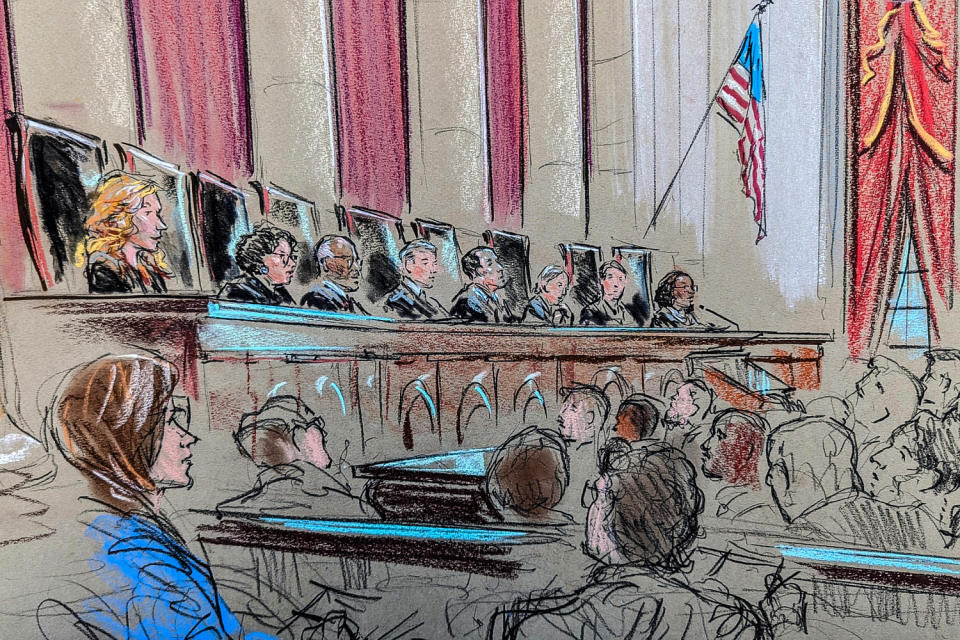The Supreme Court’s decision on presidential immunity on Monday is expected to add new twists to the case of the Fulton County, Georgia, district attorney. Fani Willis‘extortion case against former president already stalled Donald Trump and his allies.
The Georgia case, which raises some of the same issues as special counsel Jack Smith’s prosecution of Trump for federal election interference, was officially stayed last month until at least October, when an appeals court will hear arguments from Trump and some of his co-defendants challenging the presiding judge’s decision not to disqualify Willis as a prosecutor.
Judge Scott McAfee has not yet set a date for the trial. Among the motions pending before him is Trump’s request to have the charges dropped on the grounds of presidential immunity.
The Supreme Court ruled largely in Trump’s favor in the federal case Monday, finding that he enjoys immunity for some of his conduct in office and possibly for other actions as well.

Willis’ office declined to comment on the ruling. Trump’s attorney Steve Sadow referred a request for comment to the Trump campaign, which did not immediately respond.
Barbara McQuade, a legal analyst for NBC News and a former U.S. prosecutor, said the Georgia case “is now being subjected to the same scrutiny as the federal case.”
“Trump will file a motion to dismiss the case on immunity grounds, and a hearing will be needed to determine what constitutes official and unofficial conduct in the complaint,” she said in an email.
The high court’s 6-3 ruling said Trump’s contacts with Justice Department officials about his stolen election claims are protected by immunity and that he is also “presumptively immune” from prosecution for his contacts with then-Vice President Mike Pence in the weeks leading up to the Jan. 6, 2021, riot at the Capitol. Those contacts are also cited in the Georgia case.
The ruling did not resolve the question of immunity related to Trump’s contacts with people outside the federal government, including Georgia Secretary of State Brad Raffensperger. Trump’s Jan. 2, 2021, phone call in which he urged Raffensperger to “find” more votes than Joe Biden had in the state is a key part of Fulton County’s lawsuit, as is the effort to recruit so-called alternate presidential electors for Trump.
The Supreme Court’s ruling in the federal case said that determining whether such actions were official acts or not requires “a careful analysis” by the judge, including “a review of numerous alleged interactions with a wide range of state officials and private individuals.”
Allegra Lawrence-Hardy, an Atlanta attorney, said that when the official pause in the Fulton County case is eventually lifted, there will be new litigation over whether certain actions by Trump were official or not, leading to further appeals and delays.
Because it is a state case, Trump would not be able to end it if he wins the November election, as he theoretically could with the two pending federal criminal cases against him. However, Sadow, Trump’s lawyer, argued to McAfee in December that if Trump were to be re-elected, he would not be able to stand trial until after he leaves office.
“I believe that this trial, under the Supremacy Clause and his duties as President of the United States, will not occur at all until he has completed his term,” Sadow said at the time.
Norm Eisen, who worked for House Democrats during Trump’s first impeachment trial, said the Supreme Court’s expansive view of presidential immunity in Monday’s ruling could lead to legal challenges from two of Trump’s co-defendants in the Georgia case: former Justice Department civil attorney Jeffrey Clark and former White House chief of staff Mark Meadows.
At the Justice Department, Clark attempted to abuse his position to bolster Trump’s baseless claims of a stolen election, while Meadows was accused of being involved in efforts to pressure state officials in Georgia.
Eisen noted that Meadows has already argued unsuccessfully that his involvement in the 2020 election matters was due to his official duties, a claim rejected by a federal judge and a federal appeals court. A judge also rejected similar arguments from Clark; his appeal is pending.
“For Meadows, there’s still a pretty straight line” for prosecutors, Eisen said. “For Clark, probably the same, but with a few extra twists because of this decision.”
Joyce Vance, a legal analyst for NBC News, said Monday’s ruling is likely to drag out the already lengthy Georgia trial.
“We have seen how slow the process is in Georgia. It takes a long time to fight and litigate,” she said, adding that some parameters of the Supreme Court ruling remain unclear.
“Nobody should pretend that the opinion is easy to read. It’s going to take time to parse,” Vance said. “There’s a lot of complexity here.”
This article was originally published on NBCNews.com






